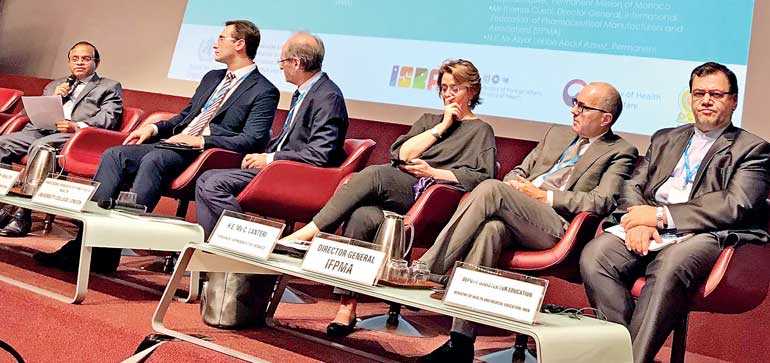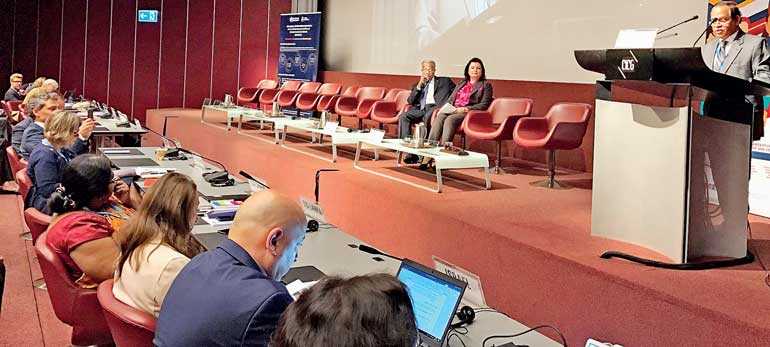Tuesday Feb 24, 2026
Tuesday Feb 24, 2026
Friday, 9 November 2018 00:00 - - {{hitsCtrl.values.hits}}


The WHO Global Coordination Mechanism for the prevention and control of Non-Communicable Diseases (GCM/NCD) concluded its General Meeting in Geneva on 6 November. The two-day Conference brought together delegates and activist from Member States, UN organisations, and non-State Actors.
The participants along with other stakeholders from the private sector, philanthropic foundations, and academic institutions, discussed means and modalities of strengthening the implementation of the SDG Agenda- 2030 and follow-up on the Political Declaration adopted at the Third High-level Meeting of the General Assembly in September 2018 on the prevention and control of NCDs.
Under the co-chairmanship of Ambassador Azeez, Permanent Representative of Sri Lanka, and the Representative of the host country, Switzerland, the meeting facilitated stakeholder interactions at policy and political levels, regarding enhancing the effective coordination of prevention and control-related activities.
The continued importance of multidisciplinary and multi-sectoral engagement, aimed to promote implementation of the WHO Global NCD Action Plan 2013-2020, and SDG 3.4 – NCD-related targets, was emphasised as was the need for building upon the existing networks of stakeholders bringing in industries, research institutions and local government bodies.
A primary objective of the GCM was to assess and renew commitments that had emerged from the recently held UN High-level Meeting of the General Assembly, and its preceding High-level Conferences in 2011 and 2014.
Addressing the forum as the co-chair, Ambassador Azeez emphasised the necessity of transforming the high level political commitments into evidence-based, data-informed policy interventions and practices and of increased international cooperation and support to effectively respond to NCD challenges.
“Multisectoral and multistakeholder collaborations is a prerequisite to achieving tangible progress in NCD prevention, thereby showing early results in the implementation of SDG 3.4 and other inter-linked targets in the overall SDG Agenda,” stated Azeez, stressing further that this required sharing of knowledge, expertise, technology and resources to make the transformative change.
He also highlighted the importance of sustained engagement of stakeholders, national and local ownership of programs and initiatives and appropriate funding mechanisms at national levels, in countries which are still struggling to make progress, for speedily addressing this growing epidemic.
The GCM Meeting had been structured around three plenary sessions and six parallel working sessions as well as an opening and two closing sessions, of which one session was devoted to high level policy discourse.
Tackling noncommunicable diseases, such as cardiovascular diseases, cancer, chronic obstructive lung disease, diabetes and mental health is timely as it is considered the number one killer in the world causing 41 million deaths each year. This includes 15 million people dying within the ages of 30 and 69 years.
More than 85% of these premature deaths take place in low- and middle-income countries, negatively affecting macroeconomic productivity, national growth, healthcare costs and household incomes. Shared risk factors causing NCDs include tobacco use, harmful use of alcohol, unhealthy diets and physical inactivity, as well as air pollution. Sri Lanka was commended by participants for its cost effective NCD prevention and control programs and for the progress made in SDG 3 4.
The delegation of Sri Lanka included Dr. Champika Wickramasinghe, Deputy Director General of the Non-Communicable Diseases of the Ministry of Health, Nutrition and Indigenous Medicine and Dulmini Dahanayake, Second Secretary of the Permanent Mission in Geneva.